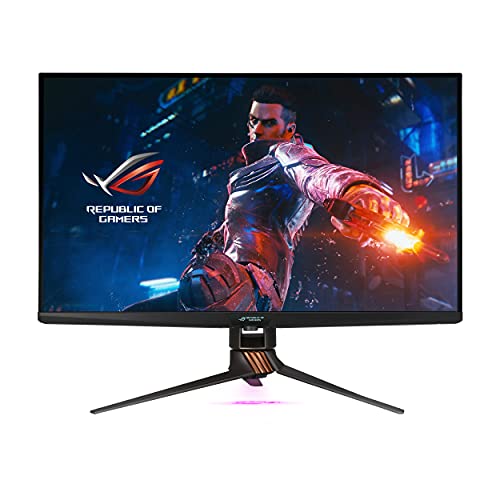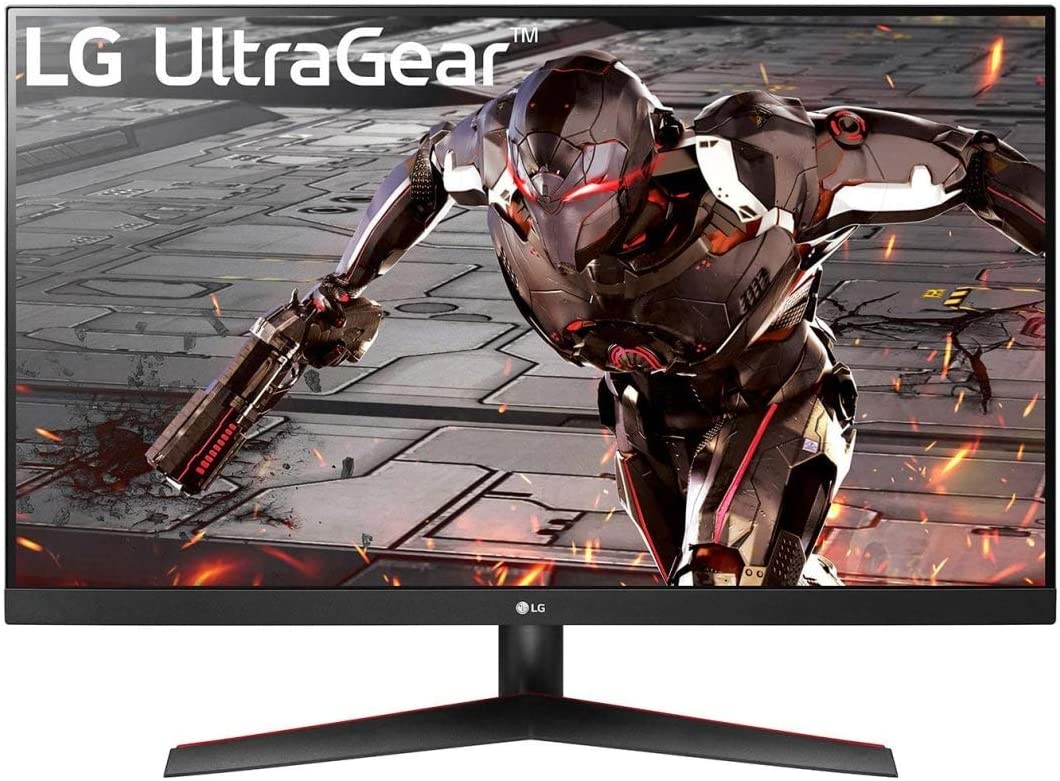The 5 best 32-inch gaming monitors for 2022
The past few years have seen a rise in the adoption of gaming monitors ranging between 27 inches and 34 inches. There is no doubt that 27 inches is the optimum size for most gamers, but there are some who prefer larger screen real estate for a more immersive experience. For them, 32 inches could be the perfect size, and we’ve put together a list of the best 32-inch gaming monitors you can find in 2022.
Our best pick from the list has to be the Gigabyte M32U, as it comes with 4K resolution, a fast refresh rate, and great color reproduction, and even throws in HDMI 2.1, allowing gamers to hook up new-generation consoles.

Gigabyte M32U
The most reasonably priced 32-inch 4K monitor
Pros
-
One of the only 32-inch 4K monitors with a high refresh rate
-
Excellent post-calibration color accuracy
-
Two HDMI 2.1 ports
-
Built-in KVM switch
-
Inexpensive
Cons
-
Poor HDR performance
-
Subpar stand
-
Bad pre-calibration color accuracy
Why should you buy this: It delivers a great 4K gaming experience and feature set for the asking price.
Who’s it for: Those who want to game at 4K resolution without spending a lot of money.
Why we picked the Gigabyte M32U:
With only a handful of 32-inch 4K gaming monitors on the market, the Gigabyte M32U stands out for offering the best value for your money. It borrows the best features from the Gigabyte Aorus FI32U but at a $200 cheaper price tag. Featuring a toned-down design, the M32U doesn’t look any different from many other 32-inch monitors, as there’s no RGB or any branding associated with gaming. However, it does pack all the important features gamers expect from a solid 4K monitor. Firstly, the monitor comes with an excellent selection of ports, including a pair of HDMI 2.1. Essentially, this enables 4K at 120Hz or 8K at 60Hz, thus making it a great choice for consoles including the PlayStation 5 and Xbox Series X. In addition to the two HDMI ports, there is also a single DisplayPort 1.4 connection offering a 144Hz refresh rate at 4K, a USB-C input port, and three USB 3.0 ports.
Gigabyte advertises 123% coverage of sRGB and 90% coverage of DCI-P3, although our testing revealed a lower 87% coverage of DCI-P3, a 950:1 contrast ratio, and a peak brightness of 366.5 nits (higher than the listed 350 nits). The M32U carries VESA’s DisplayHDR 400 certification, but the performance is mediocre and looks like it’s trying to cram too much dynamic range into too small of a space. The monitor also has a built-in KVM switch that allows you to control multiple computers with a single keyboard and mouse connected through the monitor. Gaming performance on the Gigabyte M32U is impressive though, with the panel managing to deliver sharp imagery even at high refresh rates.
Do consider, however, that to reach 144Hz at the native 4K resolution, you are going to need a powerful GPU like the RTX 3080 Ti or 3090.

Gigabyte M32U
The most reasonably priced 32-inch 4K monitor

Niels Broekhuijsen/Pro Well Tech
Asus ROG Swift PG32UQX
Best 4K gaming monitor for HDR
Pros
-
Mind-blowing HDR performance
-
Extremely high peak brightness
-
Excellent colors
-
Thread built-in for camera mounting
-
Fast, fluid gaming
Cons
-
No HDMI 2.1
-
Has audible cooling fan
-
Still not a perfect HDR experience
-
Expensive
Why should you buy this: It has fantastic color accuracy and is super bright, making it great for HDR gaming.
Who’s it for: Anyone playing HDR-compatible games who want to make the visuals really pop.
Why we picked the Asus PG32UQX:
The Asus ROG Swift PG32UQX is the most expensive monitor on this list, and for all the good reasons. It features an impressive IPS panel with 4K resolution backed with 1,152 mini-LED illumination zones with local dimming and 1,400 nits of brightness to deliver top-tier HDR performance, unlike any other gaming monitor. In our testing, we found that the monitor offers 100% of sRGB, 100% AdobeRGB, and 97% of the DCI-P3 color spaces, with color accuracy rated at a Delta-E of 1.77. That’s incredibly impressive and means that this monitor would double up as a great professional monitor for content creation.
Gaming-specific features include a 144Hz refresh rate, NVIDIA G-Sync Ultimate support, and a 4ms (GTG) response time. It also comes with unique features including a built-in cooling fan and a tiny OLED display embedded in the chin that can be customized to your liking.
It isn’t the perfect 32-inch 4K monitor, though. The lack of HDMI 2.1 and a whopping price tag of $2,999 are deal-breakers, but if you have the money and don’t really care about the latest HDMI specification, then this is a clear class leader.

Asus ROG Swift PG32UQX
Best 4K gaming monitor for HDR

Samsung Odyssey G7
Best 32-inch QHD gaming monitor
Pros
-
Excellent color reproduction
-
Beautiful design
-
Great curve for gaming immersion
-
Fast 240Hz refresh rate
Cons
-
Broken adaptive sync
-
Low static contrast performance
-
Curve off-center
Why should you buy this: It is an excellent curved gaming monitor with a high refresh rate and great colors.
Who’s it for: Those who want a 32-inch monitor to play fast-paced competitive shooting titles.
Why we picked the Samsung Odyssey G7:
Samsung’s Odyssey series of gaming monitors have been praised for their super-fast panels and 1000R curved design. The same philosophy applies to the 32-inch variant of the Odyssey G7 that packs a speedy 240Hz refresh rate VA panel with 1440p native resolution. The display is quite good in terms of color reproduction covering 100% of the sRGB space, 85% of AdobeRGB, and 90% of the DCI-P3 space, and it gets fairly bright, too. In our testing, we recorded a figure of 392 nits without HDR enabled, which is above Samsung’s quoted typical brightness of 350 nits. There is support for HDR600 as well, but due to its limited eight vertical lighting zones, the performance is modest at best.
The curved nature of the display might not be the best for productivity, especially photo editing, but it does offer an immersive experience while gaming. Additionally, the VA panel manages to deliver sharp, smear-free images even at the high refresh rates and with extremely fast motion on the screen, which makes it very easy to track fast-moving subjects in competitive shooters. The monitor did have an issue with G-Sync, but thanks to a recent firmware update, it has been resolved. Overall, if you prefer a fast refresh rate over resolution, the Samsung Odyssey G7 is what we recommend.

Samsung Odyssey G7
Best 32-inch QHD gaming monitor

LG Ultragear 32GN600-B
Best 32-inch gaming monitor on a budget
Pros
-
Low price
-
Great response time at high refresh rate
-
Excellent SDR color gamut
Why should you buy this: It’s an inexpensive 32-inch gaming monitor offering solid refresh rate and response times.
Who’s it for: Those who are looking for the best performing 32-inch monitor at a low price point.
Why we picked the LG Ultragear 32GN600-B:
LG makes some of the best monitors on the market, and the Ultragear 32GN600-B is our pick for the best 32-inch gaming monitor that you can get on a tight budget. For the asking price of about $260, this monitor surprisingly manages to hit above its weight. The VA panel has a native 1440p resolution with up to 165Hz refresh rate, 1ms (MBR) response time, and support for both Free-Sync and G-Sync. In terms of color reproduction, it is rated to hit 95% of sRGB with a 3000:1 contrast ratio and also supports HDR10. The build quality is decent with a clean and simple design, but the stand is a bit of a letdown as it only offers tilt adjustment with no options for height or swivel adjustments.
Overall, the 32GN600-B is great for gaming thanks to the low input lag and fast response time at the maximum refresh rate. It does suffer from black smearing, which is common on most VA panels, along with narrow viewing angles, but with excellent out-of-the-box calibration and great contrast, we can’t really point out any major deal-breakers.

LG Ultragear 32GN600-B
Best 32-inch gaming monitor on a budget

Dell S3222HG
Best 32-inch gaming monitor with 1080p resolution
Pros
-
Great color and contrast
-
Well-built
-
Affordable price
Why should you buy this: It is a fast gaming monitor capable of producing great colors.
Who’s it for: Gamers who specifically need a large display with a full-HD resolution.
Why we picked the Dell S3222HG:
Getting a 32-inch gaming monitor with 1080p resolution is not the most practical approach. But if you are someone who can look past the low pixel density, the Dell S3222HG is a great choice. It features a curved VA panel for an immersive look and feel, and overall, the entire monitor is very well built. Not only does it offer up to a 165Hz refresh rate, but it also comes with Adaptive-Sync and a rated response time of 4ms. The panel manages to deliver great picture quality with impressive color reproduction, and it is capable of covering 99% of the sRGB color gamut.
In terms of ports, you get two HDMI 2.0 ports, a DisplayPort 1.2, and a 3.5mm jack to plug in headphones. The S3222HG should satisfy your needs, especially if you have a budget gaming rig with a modest GPU. Overall, this monitor is great for 1080p gaming, offering a smooth experience alongside great color contrast and saturation.

Dell S3222HG
Best 32-inch gaming monitor with 1080p resolution
Frequently Asked Questions
What is the right resolution for a 32-inch gaming monitor?
If you have the right hardware, we recommend that you go for 4K resolution if you are planning to buy a new 32-inch monitor. Not only will you get great pixel density and sharp image quality, but you’ll also future-proof your gaming setup. This does not mean that 1440p or 1080p resolution is not going to look terrible, but these can be avoided unless you don’t have a powerful GPU or don’t plan on gaming at high resolution.
Can I mount a 32-inch gaming monitor to a wall?
Yes. Most modern gaming monitors come with the VESA standard mount. This means that you can attach your monitor to almost any VESA-compliant stand, be it on your desk or wall.
What is the difference between G-Sync, FreeSync, and Adaptive-Sync?
G-Sync and FreeSync are similar synching technologies developed by Nvidia and AMD respectively. They are used to improve communication between a GPU and a monitor and ensure that your PC’s frame rate is synchronized with the refresh rate of the monitor, reducing stuttering at lower frame rates. Adaptive-Sync, which was developed by VESA, is the same as FreeSync, but with a different name. Notably, G-Sync works with DisplayPort, while FreeSync and Adaptive-Sync can work on both HDMI and DisplayPort.
Editors’ Recommendations






